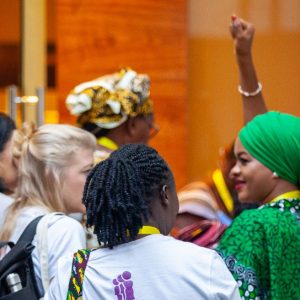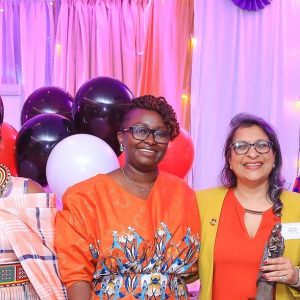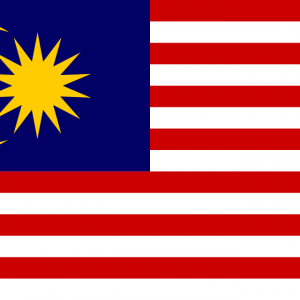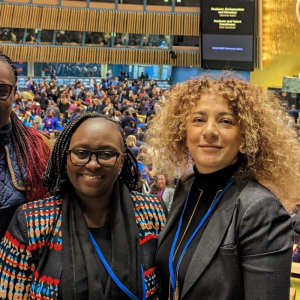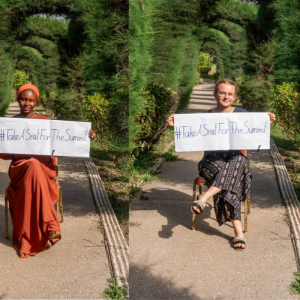One hot afternoon in October, Samba Demba Bâ, the village chief of Siriworo, greets us under the baobab tree in his community. About 1,000 people now live in Siriworo, a community that dates back to 1514, and they have collectively made the historic decision to abandon child/forced marriage and female genital cutting (FGC).
The discussions aimed at getting more information about how such a critical decision was reached, especially since Siriworo is located in the conservative Matam region in North East Senegal. Coumba Samba Lamine Bâ, the President of the Association for the Advancement of Women (AAW) and Adama Bâ, the head of the Thaiba health clinic were also there to help Samba Ba explain how the decision was made. Coumba Samba Lamine Bâ told us that Siriworo participated in Tostan’s Community Empowerment Program (CEP) in 2000.
Over the next three years, the CEP had raised the community members’ awareness on many issues, among which the harmful effects of FGC and child/forced marriage. The village chief and imams met regularly in the years that followed, but no consensus was reached. In late 2013 and early 2104, awareness-raising and social mobilization teams, supported by Orchid Project and led by Samba Diallo, a Tostan facilitator leading communities through the CEP for more than 10 years, came to discuss child/forced marriage, the dangers of having pregnancies too close together, the importance of registering births, and FGC.
The village chief told us: “When the [social mobilization teams] arrived, they called a big meeting and confirmed that they worked for Tostan. They talked about child/forced marriage and how it was essential that boys and girls didn’t get married before they the age of 18. If a girl is younger than 18 her body will not be mature enough for childbirth, and medical problems could occur.”
At the end of the meeting, the village chief decided that further discussions on these matters were essential. Awareness-raising and social mobilization teams went door-to-door to emphasize the harmful consequences of child/forced marriage and FGC. Coumba recalled that the discussions continued in the markets and in the mosques. The village imam, who is pro abandonment, stated that FGC was an outdated practice and was not justified in the Koran.
Little by little, an agreement was reached and the community decided that it was time to stop these harmful practices. The community members also agreed on measures to take to ensure that the practice would never happen again, by decreeing that people who cut girls would not be allowed back in the community: “We decided that no one would cut any of our girls ever again. Parents, heads of households, everyone knew the dangers of FGC; so a guardian for each household was appointed. If anyone lets a cutter into the community they will have to deal with us, and if they continue to do it they will be punished. We will file a complaint”, Samba Lamine Bâ explained to us.
Adama Bâ, the head of the Thaiba clinic, who knows well the harmful health effects of FGC and the risks associated with child/forced marriages said that: “ In CM2 (6th Grade), the girls know nothing about marriage; they often have to leave school and if they get pregnant too young they can risk death during childbirth. The boys also get divorced quickly, or stay at home and do nothing.”
Demba Lamine Bâ, the son of the village chief and city clerk of the municipality of Nabadji, made the arrangements for Samba Diallo’s visit. He concluded that following the meetings instigated by the awareness and social mobilization teams, the debate quickly spread throughout all community members — women, men, youth, dignitaries, and religious leaders: “Meal times were the time everyone got together to talk. Once everyone had the facts, everyone was in agreement that the only way forward was to give up these outdated
Since the visit of the awareness-raising and social mobilization teams, Adama Bâ has formed a small outreach group that visits neighboring communities to raise awareness about FGC and child/forced marriage. The story of the community members of Siriworo shows that reaching an agreement like this can take months, sometimes years. It takes time to get everyone to reconsider their positions and then get involved in the decision-making.
Story by Céline Gendre, Volunteer Communications Assistant, Tostan
This blog is part of a series on the Social Mobilisation project that Orchid Project funds in support of Tostan’s long term Community Empowerment Programme. Social Mobilisation is focused on ensuring the acceleration of abandonment of FGC in Senegal. Teams of volunteers who have already abandoned FGC, called social mobilisation agents, visit and create dialogue with inter-connected communities on human rights and the negative consequences of FGC. Their work aims to spread the message of abandonment and encourage others to join them.
Social mobilisation agents are individual members of the community who have been inspired by their understanding that FGC is a harmful practices, and are eager to share their own experiences with others. Often, they are religious, traditional or community leaders who are widely respected and well-connected, active, influential participants.
You can find out more about Social Mobilisation by clicking here. If you would like to support this work, please click here.

